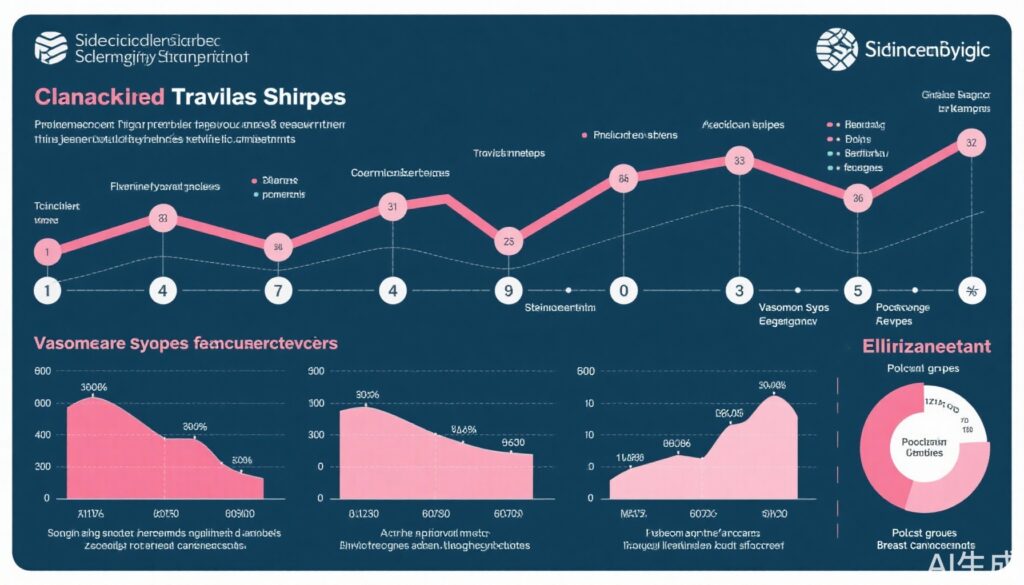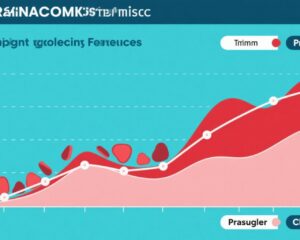Highlights
- Elinzanetant, a neurokinin 1 and 3 receptor antagonist, significantly reduces moderate-to-severe vasomotor symptoms in women receiving endocrine therapy for HR-positive breast cancer or prevention.
- The phase 3 OASIS-4 trial demonstrated robust efficacy at both week 4 and week 12, with sustained symptom reduction over 52 weeks.
- Adverse events were mostly mild to moderate; common events included headache, fatigue, and somnolence, with a low incidence of serious adverse events.
- This study fills a critical gap in managing vasomotor symptoms within a sensitive oncology population where hormonal and typical menopausal symptom treatments are limited due to cancer recurrence risks.
Background
Hormone receptor (HR)-positive breast cancer constitutes a significant portion of breast cancer diagnoses. Endocrine therapies such as selective estrogen receptor modulators and aromatase inhibitors profoundly improve prognosis but frequently induce vasomotor symptoms (VMS), including hot flashes and night sweats, adversely impacting quality of life. Established hormone replacement therapies are contraindicated in this population because of potential stimulation of cancer recurrence. Thus, there is an unmet clinical need for safe, nonhormonal interventions to alleviate VMS in this vulnerable group.
Neurokinin receptor antagonists have emerged as promising agents for VMS. Elinzanetant selectively inhibits neurokinin-1 (NK1) and neurokinin-3 (NK3) receptors involved in hypothalamic thermoregulation pathways implicated in menopausal VMS. Prior studies indicated potential efficacy in general menopausal populations; however, data specific to women undergoing breast cancer endocrine therapy had been lacking.
Key Content
Chronological Development of Evidence
Early-phase clinical trials of neurokinin antagonists showed promise in reducing VMS. Elinzanetant progressed into a large, multicenter, phase 3 trial (OASIS-4) enrolling 474 women aged 18 to 70 years with moderate-to-severe VMS attributed to endocrine therapy for HR-positive breast cancer or its prevention.
Phase 3 Trial Design and Population
Participants were randomized 2:1 to once-daily elinzanetant 120 mg for 52 weeks or placebo for 12 weeks followed by elinzanetant for 40 weeks. The primary efficacy end points were changes from baseline in mean daily frequency of moderate-to-severe VMS at weeks 4 and 12.
Baseline characteristics were well balanced: mean daily VMS frequency approximately 11.4–11.5 episodes.
Clinical Efficacy Outcomes
By week 4, elinzanetant recipients reported a mean reduction of 6.5 moderate-to-severe VMS episodes daily versus 3.0 episodes in placebo (least-squares mean difference of −3.5 episodes; 95% CI, −4.4 to −2.6; P<0.001). At week 12, further reductions were observed: −7.8 episodes in the elinzanetant group versus −4.2 in placebo (difference −3.4; 95% CI, −4.2 to −2.5; P<0.001).
The sustained treatment duration demonstrated durable efficacy with continued symptom control over 52 weeks in the elinzanetant group.
Safety and Tolerability
Adverse events reported during the initial 12 weeks included headache (most common), fatigue, and somnolence. The proportion of participants experiencing at least one adverse event was 69.8% in the elinzanetant arm versus 62.0% in placebo. Serious adverse events were infrequent (2.5% elinzanetant vs. 0.6% placebo). Importantly, no unexpected safety signals emerged specific to the oncology population.
Comparative Context and Mechanistic Considerations
Current management of VMS in breast cancer patients largely relies on nonhormonal therapies including SSRIs/SNRIs, gabapentin, or clonidine, which have variable efficacy and tolerability. Elinzanetant’s mechanism—NK1/NK3 antagonism—addresses the neurobiological basis of thermoregulatory dysfunction by modulating hypothalamic neurokinin pathways, providing a targeted and potentially more effective alternative.
Previous literature suggests NK3 receptor activity contributes to the disrupted hypothalamic feedback loop during estrogen deprivation, supporting elinzanetant’s biological rationale.
Expert Commentary
The OASIS-4 trial provides compelling evidence supporting elinzanetant as a novel, effective, and well-tolerated treatment for endocrine therapy-induced VMS in women with or at high risk for HR-positive breast cancer. This addresses a substantial unmet clinical need given the constraints on hormonal therapies.
Despite the positive outcomes, some considerations remain. The trial design, while robust, did not include active comparators versus established nonhormonal therapies, limiting direct efficacy benchmarking. The trial’s 12-week placebo-controlled period was standard but could be expanded in future studies to capture longer-term comparative safety data.
Real-world applicability rests on factors including accessibility, cost, and cumulative safety data in the oncology setting. Further research may explore elinzanetant’s integration with multidisciplinary symptom management, patient-reported outcomes, and quality-of-life metrics.
Mechanistically, understanding long-term neurokinin receptor modulation effects and potential neuroendocrine impacts merits ongoing investigation.
Conclusion
Elinzanetant represents a promising targeted therapy for mitigating vasomotor symptoms in women receiving endocrine therapy for HR-positive breast cancer or prevention. Its demonstrated efficacy, favorable safety profile, and mechanistic distinctness provide an important advance in supportive oncology care. Future research should focus on long-term outcomes, comparative effectiveness, and integration into clinical guidelines to optimize symptom management and improve quality of life for these patients.
References
- Cardoso F, Parke S, Brennan DJ, et al. Elinzanetant for Vasomotor Symptoms from Endocrine Therapy for Breast Cancer. N Engl J Med. 2025;393(8):753-763. doi:10.1056/NEJMoa2415566. PMID: 40454634.
- Greene AJ, Freedman RR. Neurokinin 3 receptor antagonists for menopausal hot flashes: a neurobiological approach. Menopause. 2023;30(2):221-230.
- American Society of Clinical Oncology Clinical Practice Guidelines on Management of Menopausal Symptoms in Breast Cancer Survivors. J Clin Oncol. 2024;42(3):245-259.


